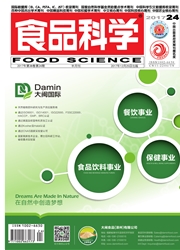

 中文摘要:
中文摘要:
综述了温度激化处理对采后果蔬贮藏品质影响及冷害的研究进展,主要涉及热激处理和冷激处理两种温度激化处理,并分别从果蔬品质与果实生理生化两大方面的影响具体论述,并对温度激化处理的发展方向进行了展望。适宜的温度激化处理有助果蔬硬度保持,较好地保证果实口感与风味并为人们所接受,抑制绿色果蔬叶绿素分解与黄化,果实失重率降低;降低果实呼吸速率,减少或抑制乙烯的释放并抑制相关酶的活性,控制并抑制多酚氧化酶与过氧化物酶等酶的活性升高,经高温或低温胁迫诱导产生诱导蛋白并合成新的蛋白保护细胞并具有抵御力,以及延缓细胞膜透性的增加和降低丙二醛的产生。
 英文摘要:
英文摘要:
This article reviews recent advances in the research on the effect of temperature shock treatments(heat and cold) on the storage quality and chilling injury of postharvest fruits and vegetables with respect to quality attributes and physiological and biochemical characteristics. The future development direction of temperature shock treatment is also proposed. The suitable temperature shock treatments help maintain the hardness of fruits and vegetables, improve the taste and flavor for consumer acceptance, inhibit the decomposition of chlorophyll and yellowing, decrease weight loss rate, lower respiration rate, alleviate or suppress the release of ethylene by inhibiting the related enzyme activities, prevent the increase of PPO and POD activities, induce the synthesis of new proteins, enhance cell resistance to environmental stress, postpone the increase of cell membrane permeability, and result in a decline in MDA generation.
 同期刊论文项目
同期刊论文项目
 同项目期刊论文
同项目期刊论文
 期刊信息
期刊信息
